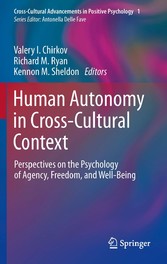
Human Autonomy in Cross-Cultural Context - Perspectives on the Psychology of Agency, Freedom, and Well-Being

von: Valery I. Chirkov, Richard M. Ryan, Kennon M. Sheldon
Springer-Verlag, 2010
ISBN: 9789048196678
Sprache: Englisch
286 Seiten, Download: 3064 KB
Format: PDF, auch als Online-Lesen
Mehr zum Inhalt

Human Autonomy in Cross-Cultural Context - Perspectives on the Psychology of Agency, Freedom, and Well-Being
| Contents | 5 | ||
| Contributors | 7 | ||
| About the Authors | 9 | ||
| 1 Introduction: The Struggle for Happiness and Autonomy in Cultural and Personal Contexts: An Overview | 15 | ||
| Why Are We Writing This Book | 15 | ||
| A Brief History of the Views Regarding the Importance of Autonomy for Human Happiness | 16 | ||
| Autonomy and the Good (Moral) Life in the Confucian Ethics | 20 | ||
| Autonomy, Agency, and Happiness in the South Asian Cultural Context | 23 | ||
| Happiness, Human Autonomy, and Self-Determination in Modern Psychology | 28 | ||
| A Deterministic Trend in Modern Psychology | 29 | ||
| Social Constructionism in Modern Psychology and the Question of Human Agency and Happiness | 30 | ||
| The Humanistic Trend in Modern Psychology | 34 | ||
| A Short Review of the Chapters | 36 | ||
| Part I A Theoretical Context of Human Autonomy and People's Flourishing | 36 | ||
| Part II Human Autonomy Across Cultures and Domains of Life: Health, Education, Interpersonal Relationships, and Work | 38 | ||
| Part III. Human Autonomy in Modern Economy, Democracy Development, and Sustainability | 39 | ||
| References | 41 | ||
| Part I A Theoretical Context of Human Autonomy, Peoples Well-Being, and Happiness | 45 | ||
| 2 Positive Psychology and Self-Determination Theory: A Natural Interface | 46 | ||
| Positive Psychology | 46 | ||
| Self-Determination Theory | 48 | ||
| SDT in Application: An Empirical Example | 50 | ||
| Implications | 51 | ||
| Relevance of the SDT Analysis for PP Theorists and Practitioners I: Supporting Autonomy | 52 | ||
| Relevance of the SDT Analysis for PP Theorists and Practitioners II: Assessing and Supporting Needs | 54 | ||
| Cross-Cultural Application of SDT | 54 | ||
| References | 56 | ||
| 3 A Self-Determination Theory Perspective on Social, Institutional, Cultural, and Economic Supports for Autonomy and Their Importance for Well-Being | 58 | ||
| Happiness and Well-Being Debated | 59 | ||
| Happiness and Wellness Defined | 60 | ||
| Basic Needs Underlying Wellness | 61 | ||
| Autonomy as a Key to Wellness | 62 | ||
| Autonomy and Relatedness: Their Dynamic Interplay | 66 | ||
| Differential Aspirations: Intrinsic and Extrinsic Life Goals | 68 | ||
| Social Contexts, Need Satisfaction, Autonomy, and Intrinsic Aspirations | 70 | ||
| Summary | 72 | ||
| References | 73 | ||
| 4 Dialectical Relationships Among Human Autonomy, the Brain, and Culture | 78 | ||
| The Nature of the Arguments Around Human Autonomy and Happiness | 79 | ||
| A Conceptual Framework | 80 | ||
| Evolutionary and Biological Basis of Human Autonomy | 82 | ||
| The Systems and Organismic Approach to Autonomy as an Emergent Property | 84 | ||
| The Brain, Frontal Lobes, and Human Autonomy | 86 | ||
| The Role of Culture and Society in Shaping Human Autonomy, Well-Being, and Their Relations | 88 | ||
| Cultures of Horizontality and Verticality in Promoting Autonomy and Self-Determination | 90 | ||
| The Empirical Support of the Cross-National Universality of the Relations of Autonomy and Happiness | 94 | ||
| Conclusion | 98 | ||
| References | 99 | ||
| Part II Human Autonomy Across Cultures and Domains of Life: Health, Education, Interpersonal Relationships, and Work | 105 | ||
| 5 The Role of Autonomy in Promoting Healthy Dyadic, Familial, and Parenting Relationships Across Cultures | 106 | ||
| Autonomy and Openness Vs. Defensiveness | 107 | ||
| Need Fulfillment in Close Relationships | 109 | ||
| Autonomy and Interpersonal Conflict | 111 | ||
| Parental Autonomy Support | 112 | ||
| Autonomy and Relational Well-Being Across Cultures | 114 | ||
| References | 118 | ||
| 6 Do Social Institutions Necessarily Suppress Individuals Need for Autonomy The Possibility of Schools as Autonomy-Promoting Contexts Across the Globe | 122 | ||
| What Makes a Social Institution Controlling | 124 | ||
| Do Social Institutions Necessarily Need to Be Controlling | 125 | ||
| Can Hierarchical Social Institutions Be Both Smooth Functioning and Noncontrolling | 129 | ||
| Can Hierarchical Schools Be Truly Autonomy Supportive | 130 | ||
| What Would an Autonomy-Promoting School Look Like | 131 | ||
| It Would Be Designed to Satisfy Students' Psychological Need for Autonomy | 131 | ||
| What Would an Autonomy-Promoting School Look Like | 136 | ||
| It Would Create Frequently Recurring Opportunities for Students to Experience Autonomy During Learning Activities | 136 | ||
| Are Autonomy-Promoting Schools Cross-Culturally Feasible | 138 | ||
| References | 139 | ||
| 7 Physical Wellness, Health Care, and Personal Autonomy | 144 | ||
| Systematic Search of the Literature | 146 | ||
| Inclusion Criteria | 146 | ||
| Exclusion Criteria | 146 | ||
| Personal Autonomy and Tobacco Outcomes | 147 | ||
| Diabetes Self-Management | 149 | ||
| Medication Adherence and Use | 150 | ||
| Substance Use and Abuse | 151 | ||
| Autonomy and Other Medical, Surgical, and Dental Outcomes | 152 | ||
| Personal Autonomy and Physical Activity/Exercise1 | 153 | ||
| Autonomy and Weight Regulation | 158 | ||
| Personal Autonomy and Dietary Behavior | 160 | ||
| Are There Subgroups Who Express Greater Preference for Expert Recommendations? | 164 | ||
| Summary Personal Autonomy and Dietary Behavior | 165 | ||
| Overall Summary | 166 | ||
| References | 168 | ||
| 8 Autonomy in the Workplace: An Essential Ingredient to Employee Engagement and Well-Being in Every Culture | 174 | ||
| Conceptualizations of Autonomy | 175 | ||
| Theoretical Frameworks | 177 | ||
| Employee Engagement | 180 | ||
| Individual Performance | 181 | ||
| Well-Being | 181 | ||
| Organizational Practices | 182 | ||
| Autonomous Work Groups | 182 | ||
| Participative Management | 184 | ||
| New Work Arrangements | 186 | ||
| Future Avenues | 188 | ||
| References | 189 | ||
| Part III Human Autonomy in Modern Economy, Democracy Development, and Sustainability | 199 | ||
| 9 Capitalism and Autonomy | 200 | ||
| Value Conflicts | 203 | ||
| Controlled, Non-autonomous Regulation of ACCs Ideology | 208 | ||
| Behaviors and Institutions | 208 | ||
| Personal Behaviors | 209 | ||
| Institutional Dynamics | 210 | ||
| Conclusion | 212 | ||
| References | 213 | ||
| 10 Economy, Peoples Personal Autonomy, and Well-Being | 216 | ||
| Introduction | 216 | ||
| The Divergence Between Economic Growth and Peoples Well-Being | 218 | ||
| The Facts | 218 | ||
| The Explanations in the Happiness Economics | 221 | ||
| Personal Autonomy: Placing a Psychological Concept into Economics | 223 | ||
| Economic Growth, the Erosion of Personal Autonomy, and Well-Being | 227 | ||
| The Explanation Based on the Deterioration of Personal Autonomy | 227 | ||
| The Integration Among Explanations | 232 | ||
| Policy | 234 | ||
| References | 238 | ||
| 11 The Development of Conceptions of Personal Autonomy, Rights, and Democracy, and Their Relation to Psychological Well-Being | 249 | ||
| Conceptions of Personal Autonomy, Freedoms, and Rights | 250 | ||
| Democratic Participation and Voice | 256 | ||
| Autonomy, Democratic Participation, and Well-Being | 259 | ||
| Conclusions | 261 | ||
| References | 262 | ||
| 12 Personal Autonomy and Environmental Sustainability | 265 | ||
| The Concept of Environmental Sustainability | 265 | ||
| Psychological Sciences Response to a Sustainable Environment | 266 | ||
| SDT and the Motivation for Pro-environmental Behaviors | 269 | ||
| Quality of Motivation and the Occurrence of PEB | 270 | ||
| Motivation for More and Less Difficult PEBs | 270 | ||
| The Search for Information About Health Risks | 272 | ||
| Determinants of Motivation for PEB | 274 | ||
| The Influence of Government Policies | 275 | ||
| The Influence of Information on Environmental Issues | 276 | ||
| Conclusion: Toward Sustainable Development | 280 | ||
| References | 281 | ||
| Index | 286 |






